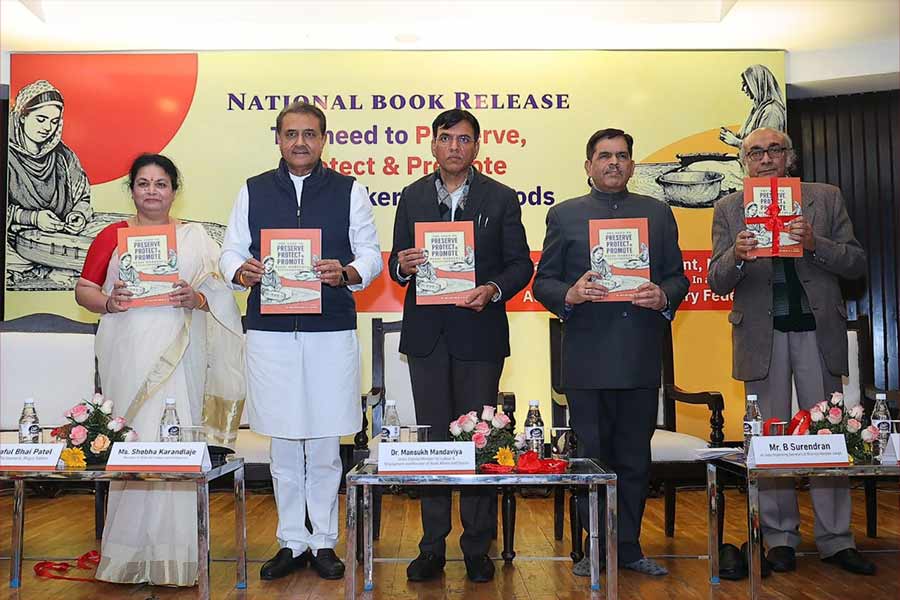A book titled The Need to Preserve, Protect, and Promote Beedi Workers’ Livelihood was launched on December 18 by the All India Bidi Industry Federation (AIBIF) and the Triniketan Foundation for Development, New Delhi, bringing attention to the socio-economic importance of the beedi industry in India, particularly in states like West Bengal. Authored by Dr Anila Nair and Dr M.M. Rehman, the book was released at the India International Centre, New Delhi, in the presence of Union Cabinet minister for labour & employment, Dr Mansukh L. Mandaviya, who is also the minister for youth affairs and sports. The other dignitaries at the launch included Rajya Sabha MP Praful Patel, Swadeshi Jagran Manch national co-convenor Dr Ashwani Mahajan, and all-India organising secretary of the Bhartiya Mazdoor Sangh, B. Surendran.
The launch included the release of major studies on the Triniketan Foundation’s website and two micro-studies conducted in Jabalpur, Madhya Pradesh, and Bagdah, West Bengal. These studies revealed that, for many women, beedi rolling is not just a job but a source of dignity and self-reliance. As one woman from Bagdah shared, this work provides them with “an opportunity to earn a livelihood from the comfort of their homes”, sparing them transport costs and giving them agency and independence. Furthermore, housing grants have allowed many workers in the region to reside in pucca houses.
Union minister Dr. Mandaviya emphasised the Narendra Modi government’s commitment to the welfare of poor people, farmers, and labourers, stating: “The mantra of the Modi government is sabka saath sabka vikash. The welfare of poor people, farmers and labourers is top priority of the Modi government.” He added: “Modiji says that we have to build a developed India. But as we move towards building a developed India, the last person in line should also receive good facilities, and they should feel that they are a part of a developed India. This is why we are working for the development of beedi workers.”
The event highlighted the inclusive nature of the beedi industry, which provides equal employment opportunities regardless of educational background or social status. The industry allows individuals, especially elderly workers and women confined to their homes due to social or cultural constraints, to earn a stable income and support their families. This is particularly significant in areas like West Bengal, home to the highest concentration of beedi workers in India, of which 98 per cent are women. The study found that this financial independence has led to a noticeable upward trend in educational opportunities for the next generation.
However, the industry’s resilience is being tested. The studies conducted in Bagdah, as well as other areas, revealed concerns about the adverse effects of the high GST rate on beedis. This has resulted in uncertainty and anxiety among workers who depend on the industry for their livelihood. According to Dr Mahajan, “Since the increase in taxation (GST) on beedis to 28 per cent from nearly zero excise duty in the past, there has been a large-scale dumping by China causing a huge loss to the exchequer, apart from major loss of employment from this major labour-intensive industry.” He added that the push to increase GST on beedis further “may lead to furthering of GST evasion, causing loss to the public exchequer apart from causing hardships to the beedi workers”.
The event included the screening of a documentary, Udaan Sapnon Ki, which showcased the success stories of families who have achieved upward social mobility through the earnings from beedi rolling. One of the most significant takeaways from the event was a quote by a woman beedi worker, “Beedi banane se hamari agli peedhi chadhti hai agli seedhi (Beedi rolling ensures that our next generation climbs the next step)”, emphasising the generational progress facilitated by this work.
The event saw the participation of over 30 Members of Parliament and State Assemblies, along with trade union representatives and beedi workers from West Bengal and Madhya Pradesh. The MPs from Telangana, Madhya Pradesh, West Bengal and Maharashtra came together to demand minimum GST for the beedi industry. These leaders stressed that beedi rolling is more than just an industry, it is a lifeline for millions, especially in regions like West Bengal. Patel stated: “It is important that people have access to employment, and the beedi industry’s key characteristic is that it provides employment in small villages where jobs are scarce.” The direct participation of beedi workers added a grassroots perspective, with many sharing personal accounts of how beedi rolling provided them with a steady livelihood.











